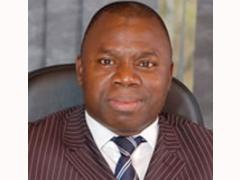
Alhassan Andani, Chief Executive of Stanbic Bank, has urged graduating students of the Ghana Institute of Journalism (GIJ) to see themselves as change-agents in society rather than waiting to be employed.
Speaking as the guest of honour at the 8th congregation of the institute, Mr. Andani added that the graduating students must wake up every day looking to fill it with something worthwhile.
“What I would like to tell the graduates is to remember that they just joined the one-third privileged few in the world that gets to hold a higher degree from a tertiary institution.
“Once you get that, you must be a change-agent. Therefore, the despondency that comes when people sit and wait for a job should not be there. People must always wake up to a day and fill it with something worthwhile; not be despondent just because they haven’t got somebody to give them instructions on what to do and what not to do,” he said.
Mr. Andani added ‘quality education’ is the aspect of education which unleashes beneficiaries to do something that galvanises the community to do something.
“Society is enriched by what sits in all of us -- what quality education tries to unleash. When you get out of quality education your deeds must move to another level; what you do and what you galvanise other people to do must just move to another level that advances your person and society,” he added.
The ceremony, under the theme “Higher Education; Enhancing Access and Quality”, saw 464 graduates for both diplomas and degrees. Out of this number, 314 graduated with Bachelors of Arts and 150 graduated with Diploma in Communications Studies.
Rector of the institute Dr. Wilberforce Sefakor Dzisah urged the students to be circumspect in the use of the skills acquired, so that these skills can be beneficial to society.
“The career path you have chosen is a vital organ of state with enormous power and responsibility within the public sphere. You must be circumspect in the use of this power in order to be beneficial to society.
“If your education and training do not benefit the society which has invested so much in you, then all the energies and efforts expended to acquire academic degrees will not merit even a footnote in the history of our people,” he said.
Dr. Dzisah added that in the next five years the institute intends to pursue a vigorous human resource and infrastructural development programme.
“This strategic vision will ensure the development of adequate and highly-qualified faculty. To this end, we are sponsoring both academic and non-academic staff to pursue higher degrees. In all, 10 lecturers have enrolled in various Doctor of Philosophy programmes with two of them having been rewarded this year.”
In infrastructural development, he noted that the institute is on course despite the financial challenges.
“While the medium- to long-term strategic plan is to accelerate the rate of development for the new site, we have as a matter of necessity been expanding facilities at our present campus in order to meet the pressing demand and to fulfil our expanded access objective as captured by the theme of the congregation,” he noted.